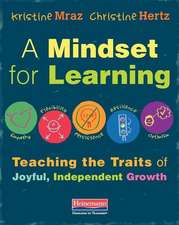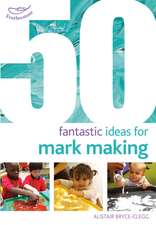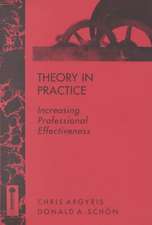The Culture of Science Education
Autor Kenneth Tobin, Wolff-Michael Rothen Limba Engleză Hardback – 16 oct 2007
| Toate formatele și edițiile | Preț | Express |
|---|---|---|
| Paperback (1) | 411.64 lei 38-44 zile | |
| Brill – 31 dec 2006 | 411.64 lei 38-44 zile | |
| Hardback (1) | 807.32 lei 38-44 zile | |
| Sense Publishers – 16 oct 2007 | 807.32 lei 38-44 zile |
Preț: 807.32 lei
Preț vechi: 1048.47 lei
-23% Nou
Puncte Express: 1211
Preț estimativ în valută:
154.50€ • 160.38$ • 128.83£
154.50€ • 160.38$ • 128.83£
Carte tipărită la comandă
Livrare economică 18-24 martie
Preluare comenzi: 021 569.72.76
Specificații
ISBN-13: 9789077874356
ISBN-10: 9077874356
Pagini: 428
Dimensiuni: 156 x 234 x 24 mm
Greutate: 0.77 kg
Editura: Sense Publishers
Locul publicării:Netherlands
ISBN-10: 9077874356
Pagini: 428
Dimensiuni: 156 x 234 x 24 mm
Greutate: 0.77 kg
Editura: Sense Publishers
Locul publicării:Netherlands
Descriere
Descriere de la o altă ediție sau format:
The Culture of Science Education: Its History in Person features the auto/biographies of the professional lives of 22 science educators from 11 countries situated in different places along the career ladder within an ongoing narrative of the cultural history of the field. Many contributors began to identify as science educators at about the time Sputnik was launched but others were not yet born. Hence the book articulates the making of a field with its twists and turns that define a career as a scholar in science education.
Through the eyes of the contributing scholars, the development of science education is seen in the United States and its spread to all parts of the world is tracked, leading to a current situation where some universities from overseas are exporting science education to the United States through graduate programs—especially doctoral degrees. Other key issues addressed are the conceptual personae, such as Jean Piaget and Lev Vygotsky, who have shaped the field of science education and how publishing in English in high-impact journals and obtaining external funds from private and governmental agencies have become driving forces in science education.
The Culture of Science Education: Its History in Person was written for science educators with an interest in the history of science education as it is experienced as lived culture. The book is intended as a reference book for scholars and as a text for graduate students involved in science education.
The Culture of Science Education: Its History in Person features the auto/biographies of the professional lives of 22 science educators from 11 countries situated in different places along the career ladder within an ongoing narrative of the cultural history of the field. Many contributors began to identify as science educators at about the time Sputnik was launched but others were not yet born. Hence the book articulates the making of a field with its twists and turns that define a career as a scholar in science education.
Through the eyes of the contributing scholars, the development of science education is seen in the United States and its spread to all parts of the world is tracked, leading to a current situation where some universities from overseas are exporting science education to the United States through graduate programs—especially doctoral degrees. Other key issues addressed are the conceptual personae, such as Jean Piaget and Lev Vygotsky, who have shaped the field of science education and how publishing in English in high-impact journals and obtaining external funds from private and governmental agencies have become driving forces in science education.
The Culture of Science Education: Its History in Person was written for science educators with an interest in the history of science education as it is experienced as lived culture. The book is intended as a reference book for scholars and as a text for graduate students involved in science education.





















